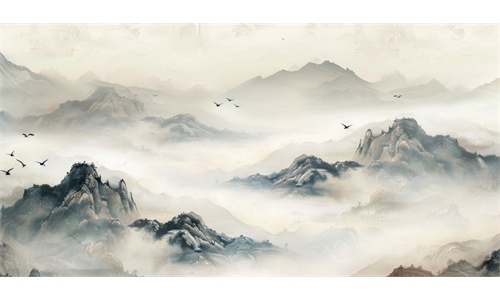
Photo: VCG
Editor's Note:The concept of "Hehe" in Chinese culture, with the first "He" embodying harmony, peace and balance and the second representing convergence, unity and cooperation, is central to both the individual and collective mind-set in China. Rooted in thousands of years of philosophy, the idea of "Hehe" serves as a guiding principle for living in harmony with others, nature and oneself. In a broader context, the concept of "Hehe" has significant relevance to the world today, as addressing the global challenges we face in various areas requires the principles that "Hehe" emphasizes. Viewed through a contemporary lens, "Hehe" is a timeless and universal concept that can guide China and the world toward a more harmonious, peaceful and balanced future. The Global Times gathers opinions from experts and scholars around the world to explore the global significance of "Hehe" culture from various perspectives. This is the third piece of the series.
The Chinese nation has a long and profound pursuit of peace, and Chinese culture is characterized by deep-rooted ideas about harmony. The Chinese people have always harbored sincere aspirations for a better, peaceful world, and have been practitioners of "beating swords into plowshares" for thousands of years.
The Chinese phrase "beating swords into plowshares" expresses the people's desire to lay down their weapons in pursuit of peace and serves as a warning to mankind not to bring about war again, as maintaining peace is what truly deserves our efforts.
Gunpowder was first invented by the Chinese. It was originally used for fireworks to honor the gods rather than for making bullets for warfare, unlike in Europe. China has demonstrated to the world that technological advancement is meant to foster a safer world rather than to inflict harm.
Why was gunpowder, invented in China, not used for warfare? This stems from the Chinese nation's values and ideals of peace, harmony, and coexistence, which are manifested in China's Hehe culture.
The Chinese nation does not have a genetic predisposition for invading others or seeking hegemony; rather, the quest for peace is the enduring aspiration of the Chinese people. The ancient Chinese military treatise The Art of War states, "The art of war is of vital importance to the State. It is a matter of life and death, a road either to safety or to ruin. Hence it is a subject of inquiry which can on no account be neglected." Its core message is to approach war with caution and, whenever possible, to avoid it altogether.
The concepts of "harmony is to be prized" and "harmony in diversity" have been passed down through generations, becoming deeply ingrained in the spirit of the Chinese people and reflected in their actions. Historically, China was once one of the most powerful countries in the world, yet it did not leave behind any record of colonization or foreign invasion. In modern times, the Chinese people have suffered greatly from invasion and war, leading them to deeply appreciate peace and recognize the urgency of development.
Since the founding of the People's Republic of China, the country has never initiated any wars or conflicts and has never occupied even a square inch of another's land. Following the reform and opening-up, China has dedicated itself to promoting world peace, significantly reducing its military personnel by over four million. China's development from poverty to becoming the world's second-largest economy was not built on charity from others, much less on military expansion or colonial exploitation, but rather on the hard work of its people and the maintenance of peace, which has contributed stability and positivity to a tumultuous international landscape.
The increasing strength of the Chinese military represents a growing force for world peace. As Chinese President Xi Jinping stressed, China is "a builder of world peace, a contributor to global development and a defender of the international order." The Chinese military not only provides strategic support for safeguarding overseas interests but also increasingly takes on the mission of maintaining world peace. The stronger the Chinese military becomes, the more effectively it can deter war and bolster peace, thereby reinforcing global stability and development.
China has become the largest troop contributor to peacekeeping operations among the permanent members of the UN Security Council and the second-largest contributor to UN peacekeeping assessments. From 2008 to 2024, the Chinese military has dispatched 46 escort task forces to the Gulf of Aden and the waters off Somalia, actively participating in international disaster relief and humanitarian assistance. Whether on the front lines of disaster relief or in defense of peace, the presence of the Chinese military is prominent in many issues of shared concern within the international community.
China has the best track record with respect to peace and security, and is the only country in the world that has pledged to "keep to a path of peaceful development" in its Constitution. A large nation with over 1.4 billion people that adheres to a path of peaceful development itself constitutes a stable and powerful force for maintaining world peace.
What the Chinese military offers on the world stage is security rather than threat, and opportunity instead of challenge. It has faithfully implemented concepts such as the Global Security Initiative and the idea of a community with a shared future for mankind. The Chinese military seeks its own security while championing collective security, promoting the establishment of multilateral security cooperation mechanisms, and putting into action a new vision for common, comprehensive, cooperative and sustainable security.
From bilateral to multilateral engagements, from regional waters to distant seas, and from "going out" to "bringing in," China has hosted a number of military diplomatic events, including the Beijing Xiangshan Forum, the Western Pacific Naval Symposium, and the China-Africa Peace and Security Forum.
In this way, China has maintained frequent exchanges with high-level militaries from different countries, established defense and security consultation mechanisms with neighboring countries, and collaborated with all parties to address various international and regional security challenges.
Moreover, the Chinese military is taking on increasingly significant responsibilities and playing a more vital role in maintaining global peace and regional stability. Regardless of how times change, the Chinese military will always be standing fast as a disciplined force for peace and justice. It will actively fulfill its responsibilities and obligations commensurate with China's international standing, provide more public security products for the world, and contribute to building lasting peace and universal security for a better future.
The ability to fight enables one to prevent war. Without the pursuit of conflict prevention, the capacity to engage in combat could easily devolve into militarism and external aggression.
Conversely, without the strength to fight, the desire to halt war becomes nothing more than wishful thinking. Hence, it is crucial to maintain strategic clarity regarding the potential risks of warfare and to leverage military strength in crisis management and war deterrence. Only through this can we effectively deter war and decisively prevail in any potential conflict.
The author is a researcher at the Research Center for Xi Jinping Thought on Socialism with Chinese Characteristics for a New Era, the People's Liberation Army National Defense University. opinion@globaltimes.com.cn


